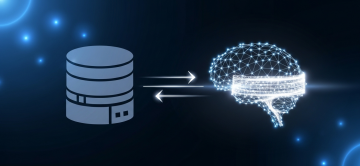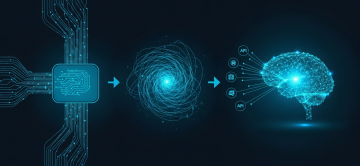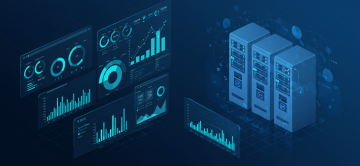The Data-Aware Agent: The Data Engineering Foundation for AI

The "Data-Aware" Agent: Why Your AI Strategy Will Fail Without a Solid Data Engineering Foundation
The enterprise AI landscape is consumed by an obsession with "the brain." Executives and engineering teams are focused on choosing the most powerful LLM, the most clever agentic framework, and the most sophisticated reasoning techniques. While important, this focus completely misses the point. An AI agent, no matter how intelligent, is useless if it's operating in a sensory deprivation tank.
The critical "why": A successful AI strategy is not determined by the raw intelligence of the model, but by the quality, timeliness, and accessibility of the data it can act upon. An agent that only knows about the public internet cannot optimize your supply chain, detect fraud in your transaction stream, or provide personalized support to your customers. Your AI strategy will succeed or fail based on the strength of its data engineering foundation. At ActiveWizards, we build these foundations to create what we call the "Data-Aware Agent."
Defining the 'Data-Aware' vs. the 'Data-Naive' Agent
The distinction is fundamental. A "Data-Naive" agent is a powerful LLM in a vacuum. It's an off-the-shelf chatbot. A "Data-Aware" agent is an integrated component of your business, connected directly to its unique data nervous system. The difference in business value is staggering.
| Attribute | Data-Naive Agent | Data-Aware Agent |
|---|---|---|
| Knowledge Source | Public internet data (up to its training cut-off date). | Your company's real-time and historical data (orders, logs, customers, inventory). |
| Decision Basis | Generic, probabilistic reasoning based on public text. | Specific, context-rich decisions based on your actual business state. |
| Example Task | "Write an email about a product discount." | "Identify customers who haven't ordered in 90 days but have high past LTV, and draft a personalized re-engagement offer for them." |
| Business Value | Commodity task automation. | High-impact, strategic business optimization. |
The Three Pillars of a Data Engineering Foundation for AI
Building a Data-Aware Agent isn't an AI problem; it's a data engineering problem first. It rests on three non-negotiable pillars that must be in place before any meaningful AI can be built on top.
Diagram 1: A Data-Aware AI Agent is supported by three critical data engineering pillars.
Pillar 1: Accessibility - Can the Agent Even See the Data?
Data locked in siloed application databases or departmental file shares is invisible to your AI. The first step is to create a unified, accessible data plane. This is the central nervous system. For real-time data, this means a streaming hub like Apache Kafka that ingests events from all parts of the business. For historical data, it means a well-structured data warehouse like Snowflake or BigQuery. A Data-Aware agent must have a single, secure point of entry to access both.
Pillar 2: Quality & Governance - Can the Agent Trust What It Sees?
Simply pooling data is not enough; it creates a data swamp, not a data foundation. An agent fed with inconsistent, poorly documented, and untrustworthy data will hallucinate, produce incorrect answers, and erode user trust. This pillar is about ensuring data is reliable and understandable.
- Schema Enforcement: Using a Schema Registry with Kafka ensures that data producers and consumers agree on the structure of data, preventing garbage data from ever entering the system.
- Data Contracts: These formal agreements define the ownership, structure, and semantics of data, treating data as a product.
- Data Cataloging: A well-maintained data catalog provides the metadata—the "comments on the code"—that tells an agent what a field like `CUST_ID_XREF` actually means.
Pillar 3: Timeliness - Is the Data Fresh or Stale?
The value of many decisions decays in seconds. An agent acting on yesterday's inventory levels or last week's customer activity is making decisions in the past. This pillar is about providing the agent with fresh, up-to-the-millisecond data. This is impossible with traditional batch ETL. It requires a real-time stream processing layer (e.g., Kafka Streams, Flink) that can perform feature engineering on the fly, calculating things like "user activity in the last 60 seconds" and feeding that directly to the agent.
A Retrieval-Augmented Generation (RAG) system is not just an AI model; it is a data product that consumes upstream data sources. Like any data product, it is subject to the "garbage in, garbage out" principle, but with a dangerous twist: LLMs are exceptionally good at producing confident-sounding nonsense from bad data. This is why the data engineering foundation is so critical. The investment in schemas, data contracts, and real-time streams isn't just "good practice"—it's the primary risk mitigation strategy for your entire AI initiative.
A Litmus Test: Is Your Organization Ready for Data-Aware AI?
Before you invest millions in a team of AI specialists, perform an honest assessment of your data foundation. Use this checklist to see where you stand.
- Can an application securely access both real-time event streams and historical warehouse data from a unified, programatic interface?
- Do you have enforced schemas for your critical data streams to prevent data quality issues at the source?
- Is your data well-documented in a catalog that an AI could theoretically use to understand table and column meanings?
- Can you generate and serve features to a model in milliseconds, or are you limited to batch processes that run hourly or daily?
- Do your data engineering and AI teams work in close collaboration, or are they siloed organizations with different priorities?
If you answered "no" or "I'm not sure" to several of these, your organization has foundational data engineering work to do before it can succeed with advanced AI.
The ActiveWizards Advantage: We Build the Brain and the Nervous System
The future of enterprise AI belongs to the Data-Aware. Building these systems requires a rare, integrated expertise that spans both sides of the divide: the scalable, resilient, and real-time systems of data engineering, and the sophisticated, reasoning capabilities of advanced AI. This is the core of ActiveWizards' philosophy.
We don't just build intelligent agents; we engineer the entire data value chain that makes them possible, from the Kafka pipeline to the stream processing layer to the RAG application itself. Don't build an AI strategy on a foundation of sand. Let's engineer your intelligence.
Build Your AI Strategy on a Rock-Solid Foundation
Go beyond the hype and build an AI capability that delivers real, measurable business value. Our experts can help you assess your data maturity and architect the end-to-end data and AI foundation your business needs to win.



Comments (0)
Add a new comment: